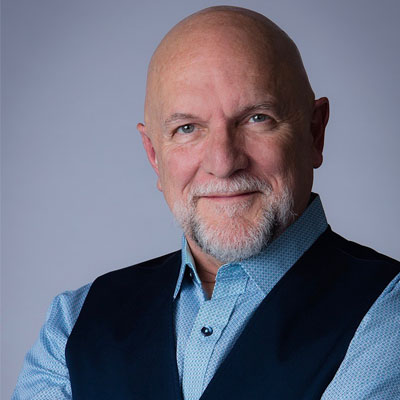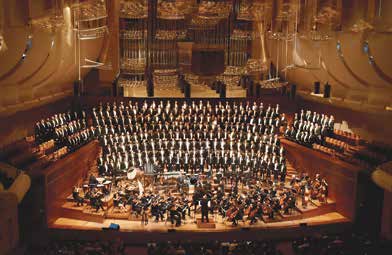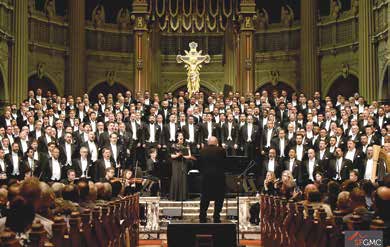
By Dr. Tim Seelig–
One of my lifelong challenges has been to discern the difference in what I do and who I am. It has been the topic of many therapy sessions when I have been unable to separate the two. One of those occurred in 2006 when I was in a difficult place with the position I held. Because I have always thrown myself into what I have done, with unbridled passion, it took over every part of my life. I would say to the therapist, “I can’t leave this; it’s who I am.” She would patiently say, “No, Tim, it is what you do, not who you are.” Over and over, until it finally sunk in, and changed the way I have looked at life since.
Coronavirus. Everything has changed. Choirs, rather than being sanctuaries of heart-opening, world-changing music-making, have become the forbidden fruit, the poison apple. We could have never imagined—in our wildest musings—this would become the case. International press has now proclaimed singing in groups one of the most dangerous activities on the planet. What? How could this revered activity that has been at the soul of civilizations over centuries fall so quickly and so far? More personally, how could the thing that marries who I am and what I do be at such a risk?

Aerosolization. Huh? I had to practice that one—after learning what it was. My mother used AquaNet on her big Texan hair. Should have known the concept at least. Merriam Webster defined it in 1944. But it was updated on April 27, 2020, to include mention of the coronavirus. It was not in the common lexicon outside scientific/medical circles prior to this spring. It’s not our fault that we did not know the word. In fact, the Wikipedia page on aerosolization was created May 10, 2020.
But learn it, we have. It is the “Danger, Will Robinson!” of our day. But, I never imagined it would be, “Danger, Tim Seelig. Choir ahead!”
So, the activity of singing together and singing for others has been taken away from us. Sure, we’ve all enjoyed creating or watching virtual choirs. But, these are actually solos put together through technology to give the impression of a choir. Sorry, but IMHO, it’s still not a choir.
There is no activity on Earth that has more positive impacts on one’s self than singing in a group. It’s not like playing an instrument that you purchase and repair and even upgrade. If you don’t like playing the flute, you can switch to guitar. With singing, you bring your instrument in the case you were born with. There’s no swapping for another instrument. It’s you. All you. Every breath, every tone borne on that air. And in the case of the San Francisco Gay Men’s Chorus, it’s 300 chorus brothers breathing at exactly the same time. STOP!!!!

That’s the problem. Singing requires the steady expulsion of air to send the sound out into the world. That world that is waiting patiently to hear it as the singers wait impatiently to, once again, create and share it.
So, what we do, what is at the very core of this thing we love, has been altered. Yes, it has been taken away. Does it change who we are? No, it does not.
We can’t do the thing. We can still remember what it felt like. We can recall that moment when our voices came together and, after much, much work, our vowels matched, our resonance choices aligned, we sang in tune and, all over the room, chill bumps popped up like microwave popcorn on the high setting! That moment when we were not 20 or 50 or 300 individuals trying to carve out our own sonorous space, but agreed. Yes, we agreed to become one voice. That is when “choir” gives us that inexplicable joy.
Now, let me hasten to say that when I teach conductors, I tell them that using “I want you to sound like one voice” is one of the worst instructions ever. Why? Because we never tell them which voice! So, the divas, assuming it is them, SING OUT! The blenders, god bless them, assume it is not them and sing even softer. With those instructions, that chasm can never be closed.
Why is choir so important? A great start in figuring that out is to take a look at American psychologist Abraham Maslow’s hierarchy of human needs. Singing in a choir hits four of the five: 2. Safety (could talk about this for hours); 3. Belonging; 4. Esteem; 5. Self-actualization. I know of no other activity that so thoroughly explores and provides all of that. And, with an occasional potluck, you can hit at least part of number one!
In reality, it’s the rehearsals that are what we miss. It is the journey, not the destination. The process, not the product. Oh sure, our mission depends on us presenting the music we master. But a huge part of our mission is the care and nurturing of each other—in between the singing!
It’s the joy of joining. It is the indescribable feeling of looking across the room and seeing someone smile while still making a vertical sound! Or seeing them cry as the singer next to them simply places a hand on their shoulder. Or sharing the stories of life with one another when the conductor is not looking. When our community has opportunities for joy, like when DOMA fell, we were there to sing. When tragedy strikes like the Pulse shooting, we were there to sing. It breaks our hearts that we can’t gather and sing to support the Black Lives Matter community during this time of injustice.
So, who are we as a choir? How can we make sure the “who we are” is not taken away? We will always remain family. We use Zoom in every possible way to stay connected. We are revisiting content we’ve already performed as well as creating new content via virtual choir as well as creating new content for SFGMC TV. The interviews for “Behind the Curtain” have been a real highlight, from Billy Porter to Chasten Buttigieg.
One of the most exciting gifts of this coronavirus hiatus came when Broadway composer, Andrew Lippa, wrote us a brand-new song. All of the singers are learning it as we speak or as I write. We hope to have a virtual choir video ready in maybe six weeks. The title is “What Will They Hear?” It begs the question of whether the first thing our audiences will hear will be music, or tears of joy, or the sound of us embracing one another.
One day soon, we will sing together—live. And, hopefully not too long after that, we will sing for you—live. It will be something we will never forget. No doubt.
It will be the day when “what we do” and “who we are” come together again.
There will be great rejoicing in the land!
Dr. Tim Seelig is the Artistic Director of the San Francisco Gay Men’s Chorus.
Published on May 11, 2020
Recent Comments